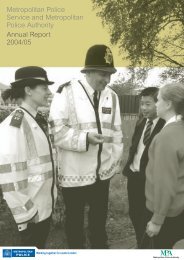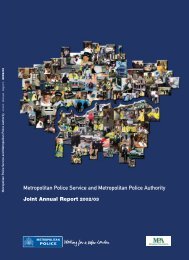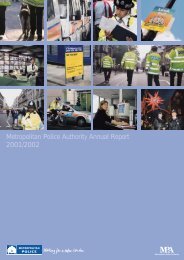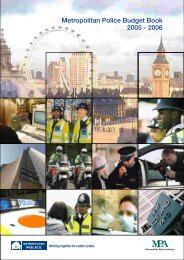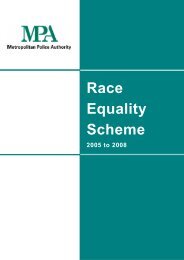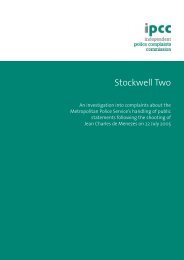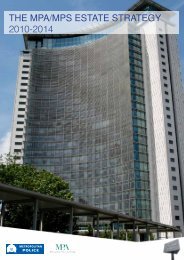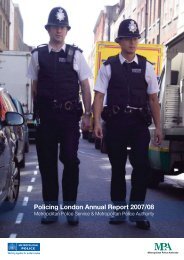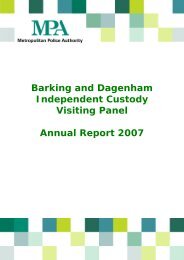Final Report of the Morris Inquiry: The Case for Change
Final Report of the Morris Inquiry: The Case for Change
Final Report of the Morris Inquiry: The Case for Change
Create successful ePaper yourself
Turn your PDF publications into a flip-book with our unique Google optimized e-Paper software.
THE CASE FOR CHANGE<br />
“People who never make mistakes never make anything.”<br />
IPCC<br />
8.1 We return in this chapter to employment matters in <strong>the</strong> MPS and focus on<br />
leadership and management. Both are vital to operational success but <strong>the</strong>y are as<br />
crucial to <strong>the</strong> issues that specifically concern us: policies, procedures and practices;<br />
how <strong>of</strong>ficers and staff are treated; how <strong>the</strong>y perceive <strong>the</strong> organisation <strong>the</strong>y work <strong>for</strong>;<br />
<strong>the</strong> relevant organisational structures; and work<strong>for</strong>ce development.<br />
<strong>The</strong> characteristics <strong>of</strong> a modernised police service<br />
8.2 Be<strong>for</strong>e we consider <strong>the</strong>se issues in detail, it is instructive to examine two<br />
versions <strong>of</strong> what it takes to make a successful organisation.<br />
8.3 We were referred to <strong>the</strong> Department <strong>of</strong> Trade and Industry publication,<br />
Accounting <strong>for</strong> People: <strong>Report</strong> <strong>of</strong> <strong>the</strong> Task Force on Human Capital Management 2003.<br />
This cites ACAS’ view <strong>of</strong> <strong>the</strong> key characteristics associated with effective<br />
organisations. <strong>The</strong>se are:<br />
● “A vision, mission and strategy that are known and understood;<br />
● An open, communicative management style with arrangements that allow employees<br />
a ‘meaningful/genuine voice’ through which <strong>the</strong>ir views are sought and considered;<br />
● A culture that encourages learning and continuous improvement and promotes <strong>the</strong><br />
updating/acquisition <strong>of</strong> skills and knowledge at every level;<br />
● A work organisation that promotes initiative and encourages team working;<br />
● Policies/practices/procedures that promote equal opportunities regardless <strong>of</strong> age,<br />
gender, race or religion along with a working environment free <strong>of</strong> discrimination,<br />
bullying, harassment;<br />
● A transparent pay and reward system that recognises employees’ contributions, treats<br />
employees fairly and is non-discriminatory;<br />
● <strong>The</strong> opportunity <strong>for</strong> all employees to work as flexibly as possible within <strong>the</strong><br />
organisation’s operational constraints so as to enable a better work-life balance;<br />
● A commitment to as much employment security as possible;<br />
● Constructive relationships with trade unions where recognised (a ‘partnership’<br />
approach), which helps to promote trust between <strong>the</strong> managers and <strong>the</strong> work<strong>for</strong>ce;<br />
● Formal procedures covering <strong>the</strong> handling <strong>of</strong> discipline, grievances, and disputes.”<br />
8.4 Additionally, in <strong>the</strong> HMIC publication, Modernising <strong>the</strong> Police Service: A <strong>The</strong>matic<br />
Inspection <strong>of</strong> Work<strong>for</strong>ce Modernisation – <strong>The</strong> Role, Management and Deployment <strong>of</strong><br />
Police Staff in <strong>the</strong> Police Service <strong>of</strong> England and Wales, <strong>the</strong> Inspectorate has indicated<br />
that it would see a modernised police organisation as having <strong>the</strong> following<br />
characteristics:<br />
178


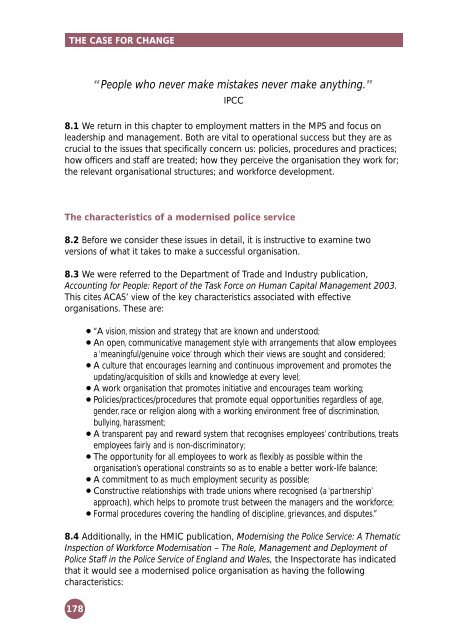
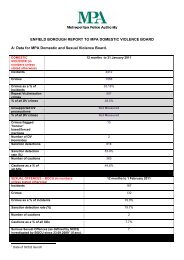
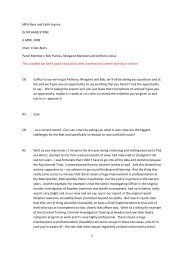
![Appendix 1 [PDF]](https://img.yumpu.com/51078997/1/184x260/appendix-1-pdf.jpg?quality=85)
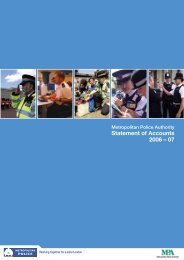
![Transcript of this meeting [PDF]](https://img.yumpu.com/50087310/1/184x260/transcript-of-this-meeting-pdf.jpg?quality=85)
![Street drinking in Hounslow [PDF]](https://img.yumpu.com/49411456/1/184x260/street-drinking-in-hounslow-pdf.jpg?quality=85)
